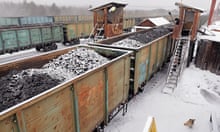If fossil fuel companies are serious about tackling the climate crisis, they could contribute to funds for poor and vulnerable countries stricken by its effects, Spain’s environment minister has said.
Teresa Ribera, a co-leader of the EU delegation at the Cop28 UN climate summit in Dubai, said: “Private corporates should be stepping into a different development model in vulnerable countries. We went through some language on that that was broadly supported by all [EU] member states, which is: why not just start by an invitation to the oil and gas companies to dedicate part of the profits to invest in sustainable development of the most vulnerable countries. And that’s on a voluntary basis [at first], because why not?”
Mandatory green taxes may also be needed on fossil fuel and other high-carbon companies, and potential levies on shipping and frequent flyers, that could generate funds for poor countries, she added. This would be in line with the “polluter pays” principle, she said, but she warned there was not yet broad agreement on such an approach.
“This is still quite challenging,” Ribera said. “There is a reluctance on the creation of these new sources of finance.”
Ribera occupies a central position at the Cop28 climate talks because Spain holds the EU’s revolving presidency, giving her a key role in the bloc’s negotiations.
Every financial and economic decision governments and businesses make should be informed by its impacts on the climate crisis, Ribera said. “We need to change the whole way we understand production and consumption everywhere,” she told the Guardian in an interview.
“The built environment, assets, infrastructure and so on – we need to reverse the understanding of what value is and what is wasting money.”
She added: “We need different arrangements [for financial and economic decision-making] so that financial understanding does take into consideration the climate aspects of every single decision. We need [to work towards] a new climate-proof economy.”
Talks have been progressing well, she said, since the vexed issue of loss and damage was resolved on the first day, last Thursday, Ribera said. Setting up a fund, paid into by major fossil fuel-emitting countries, for the rescue and rehabilitation of poor communities stricken by climate disaster, has been a major focus of developing countries for years.
This resolution had freed up negotiating time for issues such as a phase-out of fossil fuels, and helped engender higher levels of trust between developing and developed countries, she said.
“It was smart to start by providing some comfort on issues dealing with finance, loss and damage, which was so deep in the sensitivities of the vulnerable countries, which know very well they cannot cope on their own with so much damage [from the climate crisis],” she told the Guardian.
“The rest of the conversation should be dealing with how we can provide a clear way to phase down first and phase out fossil fuels, and how we can do it in a way that is consistent with the climate, with energy security, security of supply and the effective use of resources.”
Ribeira also called on rich countries to do more to help poor countries adapt to the impacts of extreme weather. “That is still tricky – to raise the bar on adaptation. We need to be much more bold,” she said. At present, only a small proportion of the climate finance provided by the rich world to developing countries is dedicated to adaptation.
Cop28: Can fossil fuel companies transition to clean energy?
On Tuesday 5 December, 8pm-9.15pm GMT, join Damian Carrington, Christiana Figueres, Tessa Khan and Mike Coffin for a livestreamed discussion on whether fossil fuel companies can transition to clean energy. Book tickets here or at theguardian.live










